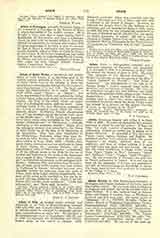

Adam, NICHOLAS, linguist and writer, b. in Paris, 1716; d.1792. He achieved distinction by a peculiar grammar of which he was the author. It bore the title: “La vraie maniere d’apprendre une langue quelconque, vivante ou morte, par le moyen de la langue francaise”. It consisted of five grammars: French, Latin, Italian, German, and English. He published another book which he called “Les quatre chapitres”,—on reason, self-love, love of our neighbor, and love of virtue—writing it in good and bad Latin, and good and bad French. He has also left many translations of classic works, among them, Pope‘s “Essay on Man“, Johnson’s “Rasselas”, Addison’s “Cato”, Young’s “Night Thoughts”, etc. He was a favorite of Choiseul, who sent him as French ambassador to Venice. It is said that he knew all the languages of Europe and possessed a rare gift of communicating his knowledge to others. For many years he had been professor of eloquence at the College of Lisieux.
T. J. CAMPBELL

